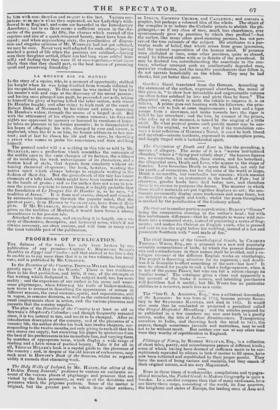LA HOUGUE HIE PE HAMBIE
Is the story of a squire, who, in a moment of opportunity, stabbed his knight when he was lying disabled from wounds inflicted by his vanquished enemy. To this crime he was incited by love for his master's wife and rage at the discovery of his secret passion ; and having once plunged into guilt, he proceeded our ards, taking to himself the glory of having killed the rebel outlaw, with whom De Hambie fought; and after rising to high rank at the court of Robert Duke of Normandy by his valour and policy. marrying Do Hambie's widow, through the means of a forged c:oll. But with the attainment of his objects comes remorse; his days and nights arc oppressed by memory or haunted by creations of fancy; he takes no pleasure in his former pursuits ; he is disappointed in his hopes of offspring: his wile, changed by care and sorrow, is neglected, when the fit is on him, for frantic addresses to her por- trait; and at last he closes his life and the story, by throttling a priest who comes to probe his conscience, and then stabbing himself.
The general reader will s. e nothing in this tale as told by Mr. BULKELEY, save a production which resembles the romaunts of the middle ages in the antic changes of its fortune, the wildness of its incidents, the weak extravagance of its characters, and a fustian kind of style, that departs from simplicity without at- taining rhetorical elequence; the book, however, wanting the native spirit w hich always belongs to originals writing in the fashion of their day. But the groundwork of the tale has latent elements of a lofty kind, which might have been turned to account in the hands of genius ; and as the author does not seem to pos- sess the powers requisite to invent them, it is highly probable that the foundation of La Hougue Ilie de Hambie is, as he says, " a tradition of Jersey." It is from real events, shaped and rounded by successive transmission through the popular mind, that the greatest poets, from Hostsa to SD AKSPEARE, have framed their plots. If Mr. BULKELLY, unacquainted with the tragedy, bad given us the tradition of Macbeth, it would have borne a strong resemblance to his present tale.
Attached to the romance, and exceeding it in length, are a va- riety of illustrative, descriptive, and historical notes, which if not always necessary, are often curious, and will form in many eyes the most valuable part of the publication.


























 Previous page
Previous page